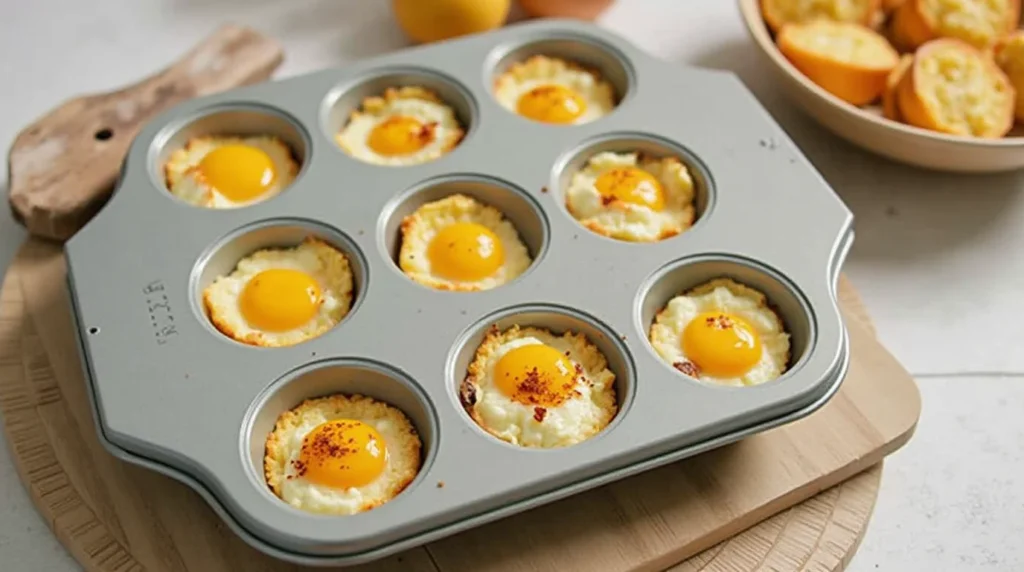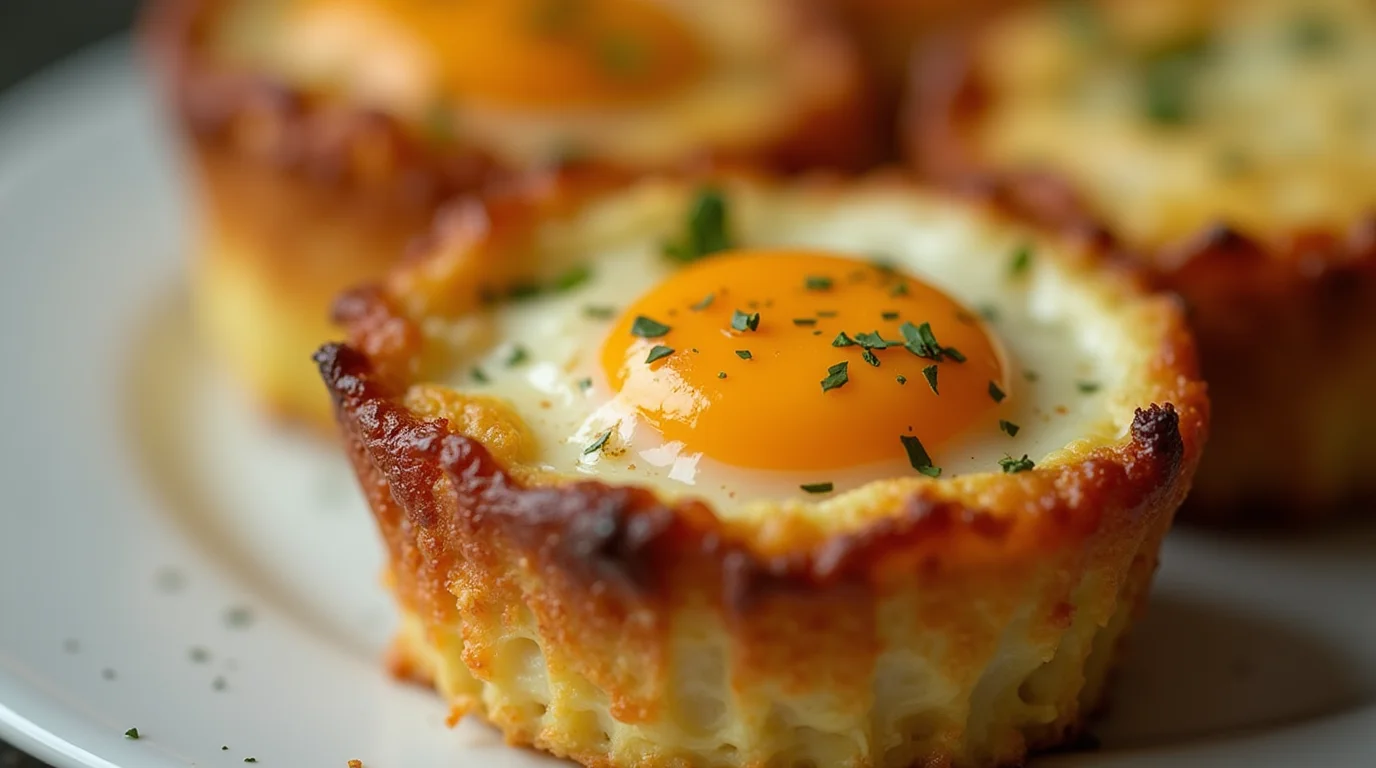Table of Contents
Mornings can be hectic, and finding a quick, nutritious, and delicious breakfast that doesn’t require a lot of time or effort can be a challenge. That’s where muffin tin eggs come in! These portable, protein-packed egg muffins are the perfect grab-and-go breakfast for anyone looking to start their day with something healthy, satisfying, and easy to make.
Whether you’re a busy professional, a parent trying to feed the family, or someone looking for a high-protein meal, muffin tin eggs can streamline your mornings while keeping you full and energized. The best part? They require minimal prep, can be customized to fit any dietary need, and can be stored for later, making them a perfect option for meal prepping.
Unlike traditional scrambled eggs or omelets, muffin tin eggs don’t need to be made fresh every morning. Instead, you can bake a batch ahead of time, store them in the fridge or freezer, and reheat them in seconds—saving you valuable time without compromising on taste or nutrition. Plus, they’re versatile, so you can mix and match vegetables, proteins, and cheeses to create endless variations that suit your taste and dietary goals.
Why Muffin Tin Eggs Are a Game-Changer:
✔ Time-Saving: No more rushing in the morning—just grab and go!
✔ High in Protein: Keeps you full and fueled for the day.
✔ Customizable: Perfect for keto, vegetarian, paleo, and low-carb diets.
✔ Meal-Prep Friendly: Make ahead and store for busy mornings.
✔ Family-Friendly: A great way to sneak in extra veggies for kids.
If you’re curious about the nutritional power of eggs, this guide explains why they are considered a superfood—packed with high-quality protein, essential vitamins, and healthy fats that support overall health, muscle growth, and sustained energy levels.
In this article, you’ll learn:
- How to make muffin tin eggs step-by-step
- The best ingredients for different diets
- How to store and reheat them properly
- Tips and tricks for avoiding common mistakes
- Creative flavor combinations for every taste
Get ready to transform your mornings with this simple yet delicious breakfast option! 🍳🥑
In this guide, we’ll explore:
- A foolproof muffin tin egg recipe
- Different variations to match dietary needs
- Expert tips for meal prep and storage
- Common mistakes and how to avoid them
- FAQs to answer all your questions
By the end, you’ll have all the information you need to make, store, and enjoy muffin tin eggs like a pro. Let’s dive in!
What Are Muffin Tin Eggs?

Muffin tin eggs—also known as egg muffins, baked egg cups, or mini frittatas—are individual servings of baked eggs, often combined with vegetables, cheese, and protein. They are cooked in a muffin tin, making them convenient and easy to prepare in bulk.
Why Are They Popular?
✔ Quick & Easy – Takes just 15 minutes to prepare
✔ Perfect for Meal Prep – Make ahead and store for the week
✔ Low-Carb & Keto-Friendly – A great alternative to carb-heavy breakfasts
✔ Protein-Packed – Keeps you full and energized
✔ Customizable – Use different ingredients to create endless variations
Muffin tin eggs are an excellent option for anyone on the go. Whether you follow a keto, paleo, vegetarian, or gluten-free diet, these versatile egg cups can be adapted to fit your lifestyle.
Need meal prep tips? Check out this expert meal prep guide for more healthy breakfast ideas!
Basic Muffin Tin Egg Recipe
Ingredients:
- 6-8 large eggs
- ¼ cup milk (optional – adds fluffiness)
- Salt & pepper to taste
- ½ cup shredded cheese (cheddar, mozzarella, or feta)
- 1 cup chopped vegetables (bell peppers, spinach, mushrooms, onions)
- ½ cup cooked protein (bacon, ham, sausage, turkey)
Instructions:
- Preheat your oven to 350°F (175°C).
- Grease your muffin tin with cooking spray or use silicone muffin cups.
- Whisk the eggs with milk, salt, and pepper in a large bowl.
- Add mix-ins like cheese, vegetables, and protein, stirring to combine.
- Pour the mixture evenly into the muffin tin, filling each cup about ¾ full.
- Bake for 15-20 minutes, or until eggs are set and lightly golden.
- Let them cool for 5 minutes, then remove from the tin.
Pro Tips:
✅ Use silicone muffin tins to prevent sticking (check out this review for the best muffin tins).
✅ Avoid overcooking to keep eggs light and fluffy.
✅ Let them cool completely before storing to avoid excess moisture.
Delicious Variations to Try

1. Classic Breakfast Muffin Tin Eggs
- Scrambled eggs, bacon, cheddar cheese, bell peppers
2. Keto & Low-Carb Muffin Tin Eggs
- Eggs, spinach, feta cheese, sun-dried tomatoes
3. Dairy-Free & Paleo Muffin Tin Eggs
- Eggs, almond milk, turkey sausage, mushrooms
4. Vegetarian Muffin Tin Eggs
- Eggs, zucchini, onions, tomatoes, basil
5. High-Protein Muffin Tin Eggs for Athletes
- Eggs, chicken breast, broccoli, mozzarella cheese
6. Kid-Friendly Muffin Tin Eggs
- Eggs, ham, cheddar, a touch of ketchup
Nutritional Benefits of Muffin Tin Eggs: A Healthy Start to Your Day
Muffin tin eggs are more than just a quick and convenient breakfast—they’re a nutritional powerhouse that supports a healthy lifestyle. Whether you’re aiming to build muscle, lose weight, or maintain steady energy levels, these protein-packed egg muffins provide the essential nutrients your body needs to function optimally.
1. High in Protein – The Key to Staying Full & Energized
Eggs are one of the best natural sources of protein, with each muffin tin egg containing around 6-8 grams of high-quality protein, depending on mix-ins. Protein is essential for:
✅ Muscle growth and repair – Helps rebuild muscle after workouts
✅ Satiety and appetite control – Keeps you full longer and prevents cravings
✅ Steady energy levels – No mid-morning crashes like with sugary breakfasts
2. Healthy Fats – Essential for Brain and Heart Health
Many people fear fats, but healthy fats are crucial for:
🥑 Brain function – Supports memory, focus, and cognitive health
❤️ Heart health – Helps reduce bad cholesterol and support cardiovascular health
🔋 Long-lasting energy – Provides slow-burning fuel for the body
Eggs contain omega-3 fatty acids and monounsaturated fats, which are great for overall health. If you want even more healthy fats, add avocado, nuts, or olive oil as toppings!
3. Packed with Vitamins & Minerals – A Natural Superfood
Muffin tin eggs are loaded with essential vitamins and minerals, including:
✔ Vitamin B12 – Supports red blood cell production and brain function
✔ Vitamin D – Strengthens bones and boosts immunity
✔ Iron – Helps carry oxygen through the bloodstream
✔ Choline – Supports brain health and metabolism
Adding vegetables like spinach, bell peppers, or mushrooms to your muffins can further boost fiber, antioxidants, and additional vitamins for a well-rounded breakfast.
4. Low in Carbs – A Keto & Diabetic-Friendly Option
For those following a low-carb or keto diet, muffin tin eggs are an ideal breakfast choice. Unlike carb-heavy breakfasts like cereal or toast, these egg muffins contain virtually zero refined carbohydrates, helping to:
✅ Stabilize blood sugar levels – Great for diabetics and those with insulin resistance
✅ Support fat loss – Encourages the body to burn fat for energy instead of carbs
✅ Reduce cravings – Prevents energy crashes and unnecessary snacking
For an extra fiber boost to complement your low-carb muffin tin eggs, pair them with bran muffins or avocado toast for a balanced, nutrient-dense meal.
5. Customizable for Any Dietary Need
One of the best things about muffin tin eggs is their versatility. You can easily adjust the ingredients to fit any dietary preference:
🥓 Keto & Low-Carb – Add cheese, bacon, spinach, and mushrooms
🥬 Vegetarian – Use bell peppers, onions, tomatoes, and feta cheese
🐟 High-Protein – Include turkey, chicken, or smoked salmon for extra protein
🥛 Dairy-Free – Skip the cheese and use dairy-free alternatives like almond milk
❌ Using too many wet ingredients → Leads to sogginess.
FAQs

1. Can I make muffin tin eggs without milk?
Yes! Milk helps make the eggs fluffier, but it is completely optional. If you prefer dairy-free eggs, you can omit the milk or use unsweetened almond, oat, or coconut milk as a substitute.
2. How do I keep muffin tin eggs from sticking?
To prevent sticking, try:
✅ Greasing the muffin tin well with oil or butter
✅ Using silicone muffin cups for easy removal
✅ Using parchment paper liners to keep the eggs from sticking to the pan
3. Can I use egg whites instead of whole eggs?
Yes! To make low-calorie egg muffins, replace whole eggs with two egg whites per egg. This keeps the muffins light and protein-rich, perfect for low-fat diets.
4. How long do muffin tin eggs last in the fridge?
Store muffin tin eggs in an airtight container in the refrigerator for up to 4 days. Always reheat before eating for the best texture and flavor.
5. Can I freeze muffin tin eggs?
Absolutely! Freezing is a great meal prep option. Follow these steps:
- Let them cool completely after baking.
- Wrap each muffin in plastic wrap or store them in a ziplock freezer bag.
- Freeze for up to 3 months.
6. What is the best way to reheat muffin tin eggs?
There are two main ways to reheat egg muffins:
- Microwave: Heat for 30 seconds (longer if frozen).
- Oven: Bake at 300°F (150°C) for 5-10 minutes until warm.
7. Can I add raw vegetables to muffin tin eggs?
Yes, but be mindful of moisture! Watery vegetables like tomatoes, zucchini, and mushrooms should be sautéed first to remove excess liquid and prevent soggy egg muffins.
8. Can I make muffin tin eggs in advance for meal prep?
Yes! Muffin tin eggs are perfect for meal prepping. Just bake them ahead of time, store in the fridge or freezer, and reheat when needed.
9. Can I use different meats and cheeses in muffin tin eggs?
Yes! Customize your muffins with different proteins and cheeses:
✔ Meats: Turkey, ham, bacon, sausage, or even shredded chicken
✔ Cheeses: Cheddar, feta, mozzarella, gouda, or Swiss
Conclusion: The Perfect Breakfast Choice
Muffin tin eggs are an easy, nutritious, and meal-prep-friendly breakfast. Whether you’re following a keto, vegetarian, or high-protein diet, these protein-packed egg muffins are an excellent way to start your day.
Pair your muffin tin eggs with a healthy side for a complete breakfast. Try serving them alongside a slice of avocado toast for added fiber and healthy fats. If you’re in the mood for something sweet, a slice of banana oatmeal is a great complement to balance out your meal.
For those who love a classic breakfast combo, consider pairing your muffin tin eggs with bran muffins for extra fiber and sustained energy throughout the morning.
Try different flavors, store them for later, and enjoy a stress-free morning. Which variation will you try first? Let me know in the comments! 😊


1 thought on “Muffin Tin Eggs: The Best Easy & Healthy Breakfast Recipe for Meal Prep”